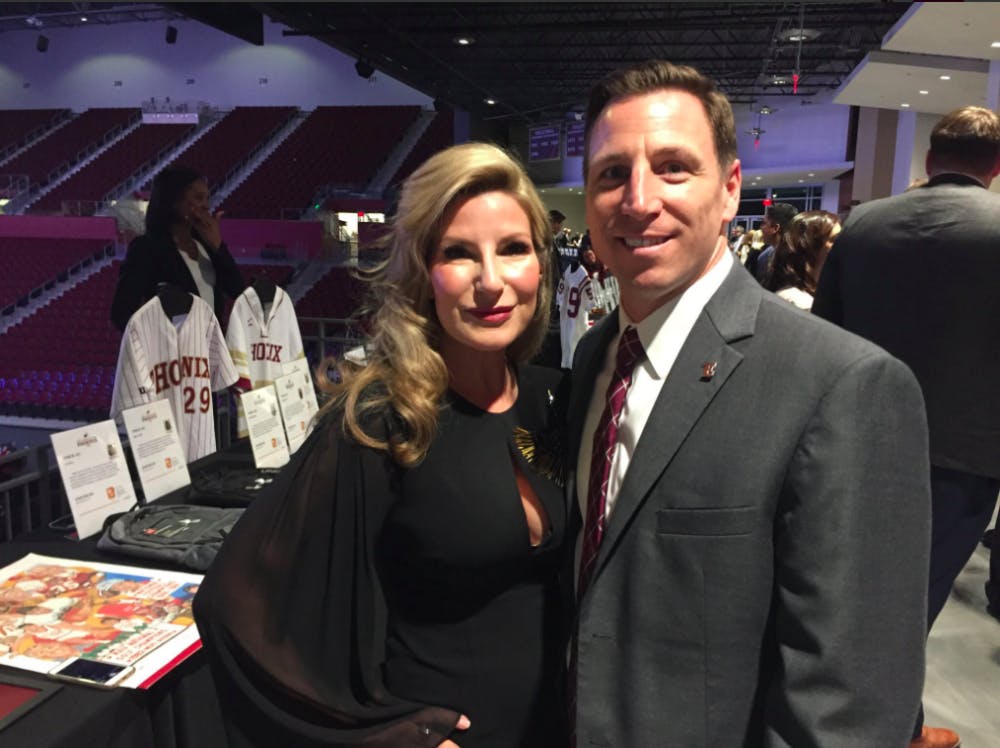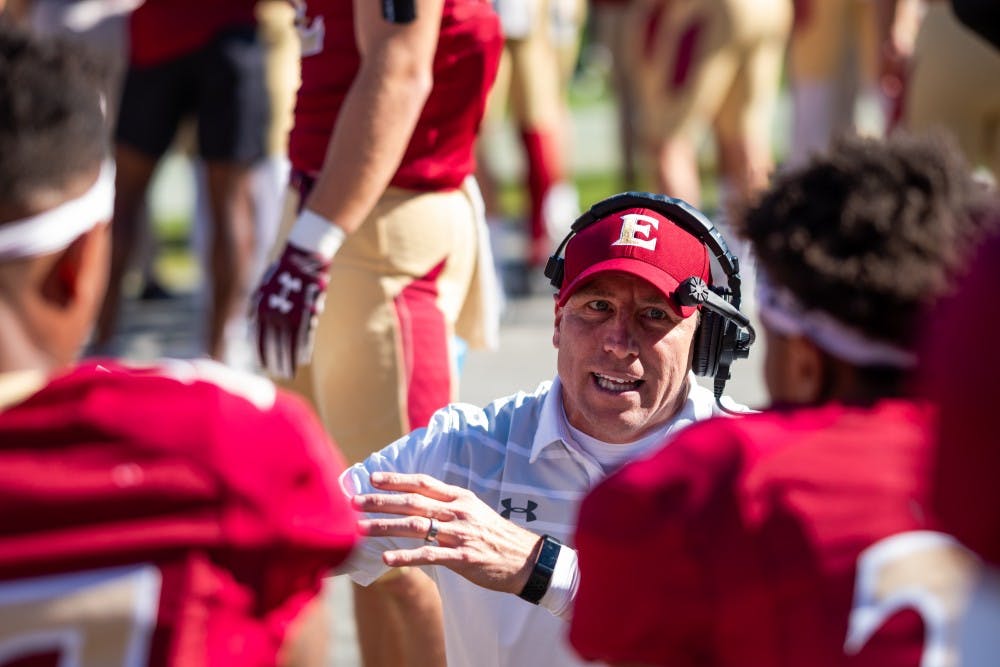Julie Trisciani didn't want to get her hopes up.
She’s seen this process involving her husband’s employment play out before. And, as she said, all she could do was hold her breath and pray because her family's future was "at the mercy of one person's decision."
“It's like waiting for Christmas,” Julie said. “Are you going to get everything you asked Santa for?”
Eight days before Christmas and less than 72 hours after Elon University head football coach Curt Cignetti abruptly resigned, Elon elevated Julie’s husband and Elon’s former defensive coordinator, Tony, to become the fifth head coach for the Phoenix in the last nine years.
Now, almost five months into the new role, the Triscianis are adjusting along with the entire football program. Tony said being head coach here presents both opportunities and challenges he’s ready to tackle.
But none are more important, Tony said, than preparing his players to be successful both as athletes and as men.
“There are no self-imposed limitations here at Elon," Tony said. "We can win a national championship here. We have the resources to do it. We have a campus and a reputation academically where we can recruit players that we can win with."
***
The first conversation the Triscianis had involved sports.
It was 2005, and Julie lived in Pennsylvania after moving from Chicago seven years earlier. Waiting for a friend, she sat by herself on a wooden stool at Starters Pub — a now-closed sports bar just outside Bethlehem, Pennsylvania.
Julie said Tony, who'd just been hired as linebackers coach at Lehigh University, approached her and asked to know her favorite sport. A diehard Chicago Cubs fan, Julie said baseball.
Julie soon learned Tony was four days on the job and had eaten dinner at Starters each night. He asked for her number, and they went on a date the next day. Four years later, they were married.

That first encounter showed Julie exactly what their bond entailed. Being the wife of a coach is hard, she said, and coaches' wives across the country deserve respect for their dedication.
For the next 11 years, the two crisscrossed the east coast with their two children as Tony accepted jobs at Elon, Whitehall High School and Villanova University.
“There’s a lot of loneliness when your husband's on the road recruiting,” Julie said. “December and January can also be a stressful time because when they get offered the new job, they're gone, so then you're left with having to sell the house and the thousand things that come along with the relocation.
"It’s not a 9-to-5 job," Julie said. "It’s a lifestyle."
Julie said she's found ways to cope with this lifestyle, finally settling two years ago when Tony returned to become the defensive coordinator at Elon, about 30 minutes away from some of Julie's family in Greensboro. When he accepted the job, Julie said she embraced her new surroundings.
But that comfort was jeopardized in December.
Cignetti, Elon’s second-year head coach revered for rebuilding the underachieving program and leading it to two consecutive Football Championship Subdivision playoff appearances, resigned to accept the James Madison University head coaching job on Dec. 14 — the day the fall semester ended.
JMU, Elon’s Colonial Athletic Association rival, had appeared in back-to-back FCS championship games and won in 2016.
While it was a shock to players and fans, Director of Athletics Dave Blank said he'd discussed with Cignetti before he made the decision. Ultimately, Blank said Cignetti felt he could win a championship there faster.
“I don't think this was about anything that's wrong with Elon,” Blank said. “It was an opportunity that he saw would be better for him to be able to pursue a national championship quicker."
In October, the Phoenix defeated the then-No. 2 ranked Dukes 27-24, ending its 22 CAA-game winning streak — a game Julie said she remembers vividly.
When she heard Cignetti left, she said she was devastated. She thought the entire coaching staff would follow him there. She wanted to stay.
“Elon is home,” Julie said. “We’re home now, and I didn’t want to leave home.”
Neither did Tony. After he overcame the initial shock, he soon told Blank he was interested in taking charge. Tony coached at varying levels for 23 years and had always wanted to be a collegiate head coach. He felt this was his opportunity.
“There wasn't much of a debate,” Tony said. “I knew that if Curt was leaving, I wanted to be the coach here and pursued it.”
Soon came a series of interviews with Blank, Deputy Director of Athletics Mike Ward, President Connie Book and other senior administrators. Julie stayed up with Tony for two nights straight, making trips to Office Max to help compile his presentation, proofread his documents and listen to him recite his points.
Blank, who wouldn’t reveal the other candidates for the role, said he didn’t seek the help of a national search firm to build a pool of prospects as he did in his last search. Regarding Tony, Blank said he was impressed with Tony's familiarity of the program.
“His body of work made him a good person to talk to right away,” Blank said. “If you can get continuity, then that’s what you want. He was prepared for conversations and had a good idea of where our program is. Our players are very familiar with him, and he certainly has done a great job directing our defense.”
When he was finally hired, Tony said it was a stressful but exciting time of transition. But now, he’s excited to get to the X’s and O’s and leave his personal mark.
“That honeymoon phase is over," Tony said. "Now it's all football. A lot of the things that have been important to us the last two years are going to continue to be important to us. But this program will have my signature on it, and there will be some things that will certainly be different, but nothing drastic.”
***
In early 2006, when Julie first met Tony’s family in their home in Manchester, New Hampshire, she saw something she said embodies the person he is. On his mother's kitchen bulletin board was an excerpt of the poem “Attitude” by Charles Swindoll.
Life is 10% of what happens to me, and 90% of how I react to it.
“Instantly when I saw that,” Julie said, “I knew that was how he was raised.”
Tony brings those lessons into his coaching style, too.
At the first team meeting in January, Tony outlined his vision for the program, excited for the journey ahead. He didn’t want to give players an extravagant speech. And ultimately, his players said he didn't need to.
“Everybody knew right then when he walked in — just by his presence of being the head coach — we all respected him,” said freshman running back Jaylan Thomas, 2018’s CAA Offensive Rookie of the Year who rushed for 761 yards and four touchdowns. “He didn't have to win us over. He gave us the blueprint, and we're going to follow the blueprint.”
That blueprint this offseason centered around “AED.” Tony judges the program off his players’ "Attitude, Effort and Discipline" on the field and in the classroom. The slogan was posted on the team’s social media accounts and preached during practices — something Tony also tweaked.
In the spring, Tony diverted from Cignetti’s practice structure. Rather than relying heavily on scrimmages, spring practices focused more on rotating drills. Junior defensive back Greg Liggs Jr. said while it’s only a minor change, he noticed a difference.

Junior defensive back Greg Liggs Jr. embraces his new head coach Tony Trisciani during the press conference announcing the appointment on Monday, Dec. 17, 2018.
“He's focusing on keeping everything in the moment that it's supposed to be,” Liggs said. “We can move from one station to the next station efficiently and maximize the time we have while we're out here.”
Tony's methodology is based on sports science and decreasing soft-tissue injuries, which defined the Phoenix's 2018 campaign.
Season-ending injuries to key players — most notably a torn ACL to sophomore quarterback Davis Cheek and a torn hamstring to senior starting running back Malcolm Summers — left Elon wondering what could have been.
The Phoenix (6-5, 4-3 CAA) darted to a 4-1 start, but only won two of the last six games, falling to Wofford College 19-7 in the first round of the playoffs. A shuffling starting lineup led to a change in strategy, which translated to seven Phoenix turnovers in the last five games.
“We weren't the same team at the end of the season that we were at the beginning,” Tony said. “We were in position to win football games, so that was disappointing.”
The key in all of this, Tony said, is developing depth. While Cheek continues to recover from surgery, the five other quarterbacks on the roster, including three freshmen, earn valuable reps. On defense, the Phoenix will continue to play in its 3-3-5 scheme and strengthen its depth up front and in the secondary.
“If the injuries were a big part of it, then we need to make sure the next man up is ready to play,” Tony said. “Right now, we’re developing mental toughness. The harder you work in the offseason, then the harder it is for you to give up on that field on a Saturday when it comes to the fourth quarter.”
Players said they haven't questioned Tony’s commitment, saying he’s been an all-around coach, caring about his players' development both on and off the field. As a program, three seniors on the 2018 team have been given opportunities to play in the NFL. For the Triscianis and the Phoenix, things look bright.
And that gives them reason to have their hopes up.
“I'm happy here,” Tony said. “I want to coach you. I want us to be successful here. In the end, I think this brought our team closer together. ”


